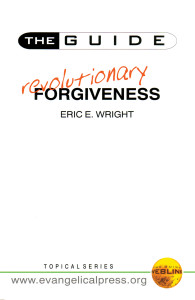REVOLUTIONARY FORGIVENESS
How to develop a forgiving lifestyle in an age of anger
- What gift could we give our family, our church, our community that would make the greatest difference to the greatest number of lives? If we learned to forgive, as Christ forgave we could revolutionize our surroundings.”
- Read this book to heal broken relationships.
- Use in home Bible studies or adult Sunday School classes Revolutionary Forgiveness is a biblically rooted assessment of the causes of bitterness, anger and alienation that prescribes a thoroughly Scriptural solution with particular reference to the joy of divine forgiveness and the practical guidance to be found in the teachings and example of Jesus Christ.
- Contemporary design and layout
- Discussion questions concluding each chapter make it ideal for either group study or personal devotions.
Revolutionary Forgiveness
Published by Evangelical Press England
Revolutionary Forgiveness is available from the following distributors: Sola Scriptura Evangelical Press
**Scroll down to read a sample chapter**
Table of ContentsPART ONE – CREATING A CLIMATE OF FORGIVENESS
1. Forgiveness – Rare but Revolutionary
2. Gaining a Personal Perspective
3. Gaining a Heavenly Perspective
4. Unearthing the bitter root that poisons forgiveness
5. Isolating the cycle of alienation
6. Creating a climate of forgiveness
7. Forgiveness: what it is and what it isnÕt
8. Forgiveness and reconciliation
PART TWO – PRACTICAL QUESTIONS ABOUT FORGIVENESS
9. Who takes the first step?
10. How do congregational and individual approaches differ?
11. Must I forgive the unrepentant?
12. What about restitution?
13. How can I deal with my wounded emotions?
14. Should I ask forgiveness for my ancestors?
15. How can I become a forgiving person – beatitudes
Bibliography, Subject Index, Scripture index
|
SAMPLE CHAPTER of Revolutionary Forgiveness
CHAPTER ONE – FORGIVENESS: RARE BUT REVOLUTIONARY
Our granddaughter Kassandra grimaced. Tears began to well up in her eyes. The problem? Asking for forgiveness. She had just walloped one of her sisters and her mother was urging her, “All I want you to do is tell Adrianna you’re sorry.” From across the room I could see resistance stiffening her body. Kassandra tried every weapon in her four-year-old arsenal in an attempt to avoid saying those two little words.
“Kassandra, you’re not alone with that problem,” I thought, as I remembered how difficult I had found apologizing to my wife, Mary Helen, a few days previously.
Asking forgiveness shouldn’t be a big deal. Just a few simple words; “I’m sorry honey,” or “I shouldn’t have acted that way. Please forgive me.” A kiss and a hug, and suddenly the gathering gloom would flee before the reflected light of the Great Forgiver – the Sun of Righteousness who loves to shine his light into our dark world.
And yet, from the cradle to the grave, bitterness darkens so many of our lives. We can understand why a child might find saying “I’m sorry” difficult, but it is much harder to understand why we, who are adults, take such an irrational approach to grievances.
The theme runs like a dark thread through many award-winning novels. In his book, What’s So Amazing About Grace?, Philip Yancey gives several examples. In Garcia Márquez’s book, Love in the Time of Cholera, a marriage is portrayed that disintegrates over the failure of the wife to replace soap in the bathroom. The husband exaggerated the problem. The wife refused to admit that she forgot. Since neither would ask forgiveness they slept in separate rooms for seven months and ate in silence.
In The Knot of Vipers by François Mauriac a husband sleeps down the hall from his wife for 30 years. The cause was a rift over whether the husband had expressed enough concern for their sick daughter.
In The Liar’s Club, her memoir of a dysfunctional family, Mary Karr tells of an uncle who did not speak with his wife for 40 years after a fight over how much she spent on sugar. “One day he took out a lumber saw and sawed their house exactly in half. He nailed up planks to cover the raw sides and moved one of the two halves behind a copse of scruffy pine trees on the same acre of ground… They lived out the rest of their days in separate half-houses.” 1
Stories like these reflect the tip of an iceberg of alienation that plagues humanity around the globe. Its frigid presence has led to blighted families and lonely people, guilt-ridden lives and chaotic courts, wealthy lawyers and skyrocketing divorce rates. Single-parent families. Fractured partnerships. Grudges. Sniping among office associates. Name-calling. Feuds. Vendettas.
Far from being restricted to one-on-one relationships, bitterness has blighted ethnic and political relations on every continent in every period of history; Jewish-Palestinian enmity; Irish tensions in Northern Ireland; English-French ill will in Canada; black-white rancor; Tutsi-Hutu hatred in Africa.
Resentment and bitterness, with its attendant refusal to apologize or seek reconciliation between parties, has written most of human history. In many circles offering an apology is viewed as a weakness. Indeed revenge is an honourable duty in many cultures. Consider several examples from both current affairs and more distant history:
- Anti-Semitism has stained much of history with blood. Mediaeval Christians, refusing to acknowledge the role of all humanity in the death of Christ, blamed the Jewish people. Many of our Jewish friends accurately point to this erroneous belief as the rationale behind the actions of “Christian nations” in the crusades and during the Spanish Inquisition. They also point to the Church’s widespread failure to oppose Hitler’s holocaust.
- Many modern Muslims continue to hold all Christians accountable for the atrocities of the crusades in the eleventh and twelfth centuries.
- Perversely, many politicians have been admired for their refusal to admit culpability. The tough, in-your-face arrogance of Pierre Trudeau, former Prime Minister of Canada, who refused to apologize when he was shown to be wrong, seemed to endear him to the populace.
- It could be argued persuasively that the gargantuan size of the civil justice system with all its courts, judges and lawyers indicates a propensity to litigate rather than resolve conflicts. The huge backlog of cases in many western courts points to an unhealthy growth in our society’s desire to settle for nothing less than a pound of flesh from one’s opponent – to squabble, sue and retaliate whatever the cost.
- In recent years, nothing epitomizes the thirst for revenge more than the terrorist attack on the United States on Sept 11th, 2001. But revenge for what? American power? Support of Israel? Stationing troops on Saudi soil? Revenge that inflicted horrific suffering on thousands of innocent people from over sixty countries who happened to be working in or visiting the World Trade Centre at the time of the attack.
Although negative examples seem much more prevalent, occasionally the power of forgiveness has been recognized:
- Once while attending services in the cathedral at Frankfort, Otto the Great encountered an emaciated man dressed in sackcloth who fell at his feet and pleaded for mercy. Upon recognizing the penitent as the brother who had years before done evil to him, he pushed him away with his foot. Just then he heard the minister reading from Matthew 18 about forgiving a brother seventy times seven. Stricken, he returned to where his brother lay sobbing, raised him to his feet, and planted a kiss of pardon on his brow. From that day the brother became his most trusted helper.
- In a review of the Watergate scandal that propelled Richard Nixon from office as the U.S. president, CBS commentator Dan Rather ventured that if Nixon had admitted wrongdoing and asked the American people for forgiveness, he would have survived.2 The continued ranking of Bill Clinton high in the polls following his public confession of fault in his affair with Monica Lewinsky gives some credence to this view.
- The growth of ADR, Alternate Dispute Resolution, as a way of reducing litigation, is due to the growing recognition that litigants could resolve adversarial situations by working through their disputes with the help of trained mediators.
- In a recent program on palliative care for the terminally ill it was pointed out that the dying need to say, “I forgive you” or “Please forgive me,” before they die. Those who approach death without seeking reconciliation with estranged family members suffer much more than those who are at peace with their relatives.
Failure to give and receive forgiveness continues to be, as it has been since the dawn of human history, an enormous social problem with the direst of consequences. So important is the matter of forgiveness that Morton Weinfeld, Director of McGill University’s Ethnic Studies Program has written that “Societies can be judged best not by their sins but by the nature of their atonement or redress… Our debt to aboriginal Canadians is greatest, and it remains unpaid. We are diminished as a result.”3 Note his, perhaps unconscious, use of a religious term – atonement, a central biblical concept. We’ll deal with how God takes the initiative to provide atonement for our sins in chapter three. Without atonement justice cannot be redressed and guilt cannot be relieved.
These few examples portray our universal need to give and receive forgiveness. They also demonstrate the revolutionary change forgiveness can inject into hostile situations. Surely, then, those of us who have been forgiven by God should be the first to offer and receive forgiveness. But no! Unfortunately, bitterness is all too common in our churches.
- The chairman of the church’s nomination committee is informed, “Don’t put them on the same committee. Their families have never gotten along since their fathers disagreed on the building project in ’65.”
- When the church board rejects a favourite project, a deaconess stops going to church and takes up golf.
- A middle-aged woman approaches her pastor concerning reconciliation with her divorced husband. She claims that they are both Christians, but that harsh words after a quarrel led to 25 years of alienation. Their family has suffered terribly. Each has been too proud to ask the other for forgiveness. But now, with her husband in the hospital, she wants to be remarried.
- Ever since his clash with a previous pastor, Jim Jenkins (not his real name) rebuffs any attempt to involve him in church life. The pastor admitted his fault and was reconciled to Jim before moving on to another congregation. Jenkins, however, refuses to forgive the elders who failed to support him at that time.
- Ernest Hemingway was brought up in a family whose grandparents attended evangelical Wheaton College. His devout parents, however, hated his libertine lifestyle so much that “after a time his mother refused to allow him in her presence.” Instead of radiating grace and forgiveness, his mother thought of creative ways to burden him down with feelings of guilt. Hemmingway never got over his enmity towards her and her Saviour.4
Uncommon? Unfortunately not. During my years as a pastor one of my first tasks in a new church has often been to deal with any real or perceived bitterness that lingers as a legacy from the past. Not that I’m eager to point the finger at others. After 46 years of following Christ, I still struggle to say, “I’m sorry, forgive me.”
Why is the problem so prevalent among Christians when our eternal destiny is secured through the forgiving grace of God? We all know the parable about the servant who was forgiven a million but rejected an appeal from a fellow servant to forgive an insignificant debt. Such conduct in Christians creates a jarring dissonance when laid alongside the cry of Jesus from the cross. “Father forgive them for they know not what they do.”
Every time we pray in harmony with Jesus’ model prayer we ask the Father to, “Forgive us our debts as we also have forgiven our debtors . . . For if you forgive men when they sin against you, your heavenly Father will also forgive you. But if you do not forgive men their sins, your Father will not forgive your sins” (Matt. 6:12,14,15).
An unforgiving lifestyle calls into question our identity as children of God. After all, peach trees do not produce lemons neither does the Great Forgiver produce bitter children.
In one sense forgiveness should be a very simple practice to embrace. And yet it is theologically profound, intertwined as it is with biblical concepts such as atonement, reconciliation, pardon, remission, justification and propitiation. But that is as it should be. Theology and practice are two sides of the Christian coin. Theology without application is hypocrisy and practice that is not based on theology is dangerous.
Forgiveness is one of the most practical and down-to-earth aspects of the Christian faith. It exemplifies grace and mercy. It demonstrates what love is all about. It is restorative, constructive, encouraging, transforming. Forgiveness is a beautiful thing!
What would happen to society if everyone could begin each day with a slate wiped free of grievances, bitterness, anger, failure and sin? If each sunrise saw us waking to a day purified from all of the fallout of our relational wars? What would happen in our churches? What would happen in the workplace? What would happen among nations? What would happen in our families?
Hope, however, is tempered by reality. In spite of the fact that forgiveness knits together the fraying strands of torn relationships like nothing else, there is something in human nature that rises up in resistance to its application. Forgiveness is an incendiary concept to all who are self-righteous, to all who poison their lives with bitterness, to all who give resentment soil in which to grow. It’s as if there is an “unforgiveness” gene spliced into our DNA. We seem to view saying, “I’m sorry” as if it were a fundamental attack on our ego. We worry that succumbing to its lure will fundamentally weaken the defenses we have spent years to build up. As if admission that we were wrong would dynamite the castle of self-esteem we have laboured so hard to build. And so families continue to break up, friendships crash, churches split and nations divide and go to war.
But when forgiveness is offered, revolutionary things occur. Henry Van Dyke tells of a young labourer who lost a valuable tool only to recognize it later in the toolkit of a fellow employee. Realizing that he was the only Christian in the small factory, the young labourer felt an obligation to live what he believed. Consequently, he went to the offender and said, “I see you have one of my tools, but you may keep it if you need it.” Going back to work he put the incident out of his mind. During the next three weeks, however, the thief tried three times to give back the value of the tool. Soon the thief and the young labourer became fast friends because, as the thief explained, “I couldn’t stand being forgiven.” Van Dyke comments that “loving forgiveness is probably the most powerful tool the Christian has in his kit of virtues.”5
Whether exercized in a western factory or in an African village, Christian forgiveness is a revolutionary force. The story is told of the wife of a Zulu chief who was converted after attending a gospel meeting. Upon hearing of her conversion, her husband forbade her to ever attend such a service again. However, the power of the gospel had been so magnetic that she felt compelled to hear more. Discovering her absence, the chief met her on the way back from the meeting and beat her so savagely that he left her for dead. Later his curiosity moved him to go back and look for her. After a considerable search, he found her lying under a bush. “And what can your Jesus Christ do for you now?” he hissed with hatred in his glance. She opened her eyes, and, looking at him with a sweetness he had never seen before, said gently, “He helps me to forgive you!”6
The astonishing response of this Zulu woman demonstrates the revolutionary nature of forgiveness – it also raises many questions. Where did she get the strength to reject anger and reply lovingly? How could she forgive him until he confessed his abusive behaviour? After all he was not repentant. Questions such as these, and many more, will be discussed in Part Two – Practical Questions About Forgiveness. But first we need to draw back the curtain on some unpleasant facts about human nature and some astonishing facts about God’s grace.
|
1 Phillip Yancey, What’s So Amazing About Grace?, Grand Rapids: Zondervan, 1997, p. 98 2 CBS Evening News, April 15, 1998 3 Insert in a column by Haroon Siddiqui, The Toronto Star: Dec. 12, 1999, p. A15 4 Phillip Yancey, p. 38 5 Story in Daily Bread, March 10, (uncertain year, pre-1984), Grand Rapids 6 Ibid.
|










A motivating discussion is definitely worth comment. I do believe that you should write more on this subject matter, it might not be a taboo subject but generally people don’t discuss these issues. To the next! Many thanks!!|
I’ve written much more on this subject. It is contained in the chapters of the book, Revolutionary Forgiveness available as a paperback or ebook from Amazon, Smashwords, Kobo, Barnes & Noble, et.